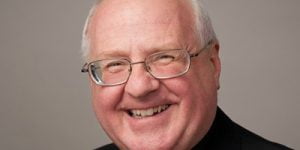
Father Mark Goldasich is the pastor of Sacred Heart parish in Tonganoxie. he has been editor of the Leaven since 1989.
by Father Mark Goldasich
Three different churches, three different celebrations, and three different homilies equal one long day.
That’s the “math” that I experienced this past Saturday. It sometimes hap – pens this way: I celebrated the funeral Mass for the mom of a good friend at my home parish in Kansas City, Kan., then the wedding Mass of the daughter of my cousin in Shawnee, and finally the evening Mass back at my parish in Tonganoxie. Given all of the preaching I did that day, I feel somewhat hypocriti – cal in writing this column. It’s like the pot calling the kettle black.
Nonetheless, because this is what I’m usually thinking at this time of year, I might as well say it: Who in the world thought it would be a good idea to have a bunch of speakers at graduations? I suspect that the original intention was a good one: to give students about to enter a new phase of their lives a bit of wisdom and guidance. But, given the fact that most graduates have zoned out way before the actual graduation ceremony, it just seems kind of futile. I’m not saying that there aren’t good and important things being said. It’s just that I suspect most of that advice is falling on deaf — or at least, distracted — ears.
Sadly, the best and most knowledgeable graduation speakers would probably be the kids’ parents. But, honestly, what are the chances that their message would be heard? Given the chance, however, here’s what parents might love to say:
We gave you life, but we cannot live it for you.
We can teach you things, but we cannot make you learn.
We can give you directions, but we cannot be there to lead you.
We can allow you freedom, but we cannot account for it.
We can take you to church, but we cannot make you believe.
We can teach you right from wrong, but we cannot always decide for you.
We can offer you advice, but we cannot accept it for you.
We can give you love, but we cannot force it upon you.
We can teach you to share, but we cannot make you unselfish.
We can teach you respect, but we cannot force you to show honor.
We can advise you about friends, but we cannot choose them for you.
We can tell you about the facts of life, but we cannot build your reputation.
We can tell you about drinking, but we cannot say “no” for you.
We can tell you about lofty goals, but we cannot achieve them for you.
We can teach you kindness, but we cannot force you to be gracious.
We can warn you about sin, but we cannot make you walk with God.
We can tell you how to live, but we cannot give you eternal life. (Found in Brian Cavanaugh’s “Sower’s Seeds That Nurture Family Values.”)
While it’s important for those farther along on the road of life to provide direction to those just starting out, maybe speechmaking isn’t the best method for conveying that wisdom.
I would suggest, instead, making use of the written word. Why? Because those words can be read and pondered many times over.
So, if you know of someone who is graduating in these days, consider sending them a graduation card. In addition to a gift, why not also enclose a “clip and save” list of “My Secrets to a Happy Life.” Mine would consist of the following:
1. Read at least one book a month that you don’t have to. Alternate your reading between books for pleasure (like novels) and books that teach you something and make you think.
2. Believe your beliefs and doubt your doubts. Most people do the opposite.
3. If your mind goes blank, be sure to turn off the sound.
4. Have a healthy sense of humor, especially about yourself.
5. You are not — repeat, not — the center of the universe.
6. Remember that Jesus is always your good shepherd, who will lead you where you need to be . . . if you let him. Even if you stray far from the flock, he’s always there — calling your name, searching for you, waiting to welcome you back home.
Certainly the best advice for graduates will never be a matter of words — whether spoken or written. We teach best by how well we live our beliefs.
Hey, if we can’t get rid of graduation speeches altogether, maybe we can at least remind speakers (including homilists) that the recipe for a good speech always includes some shortening.

